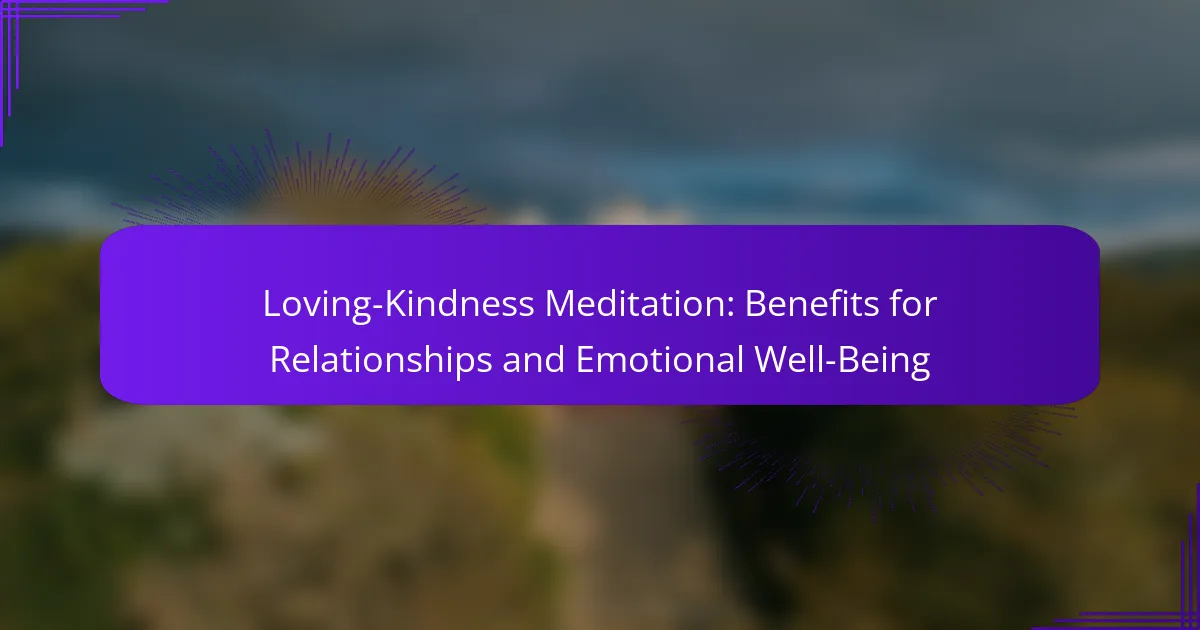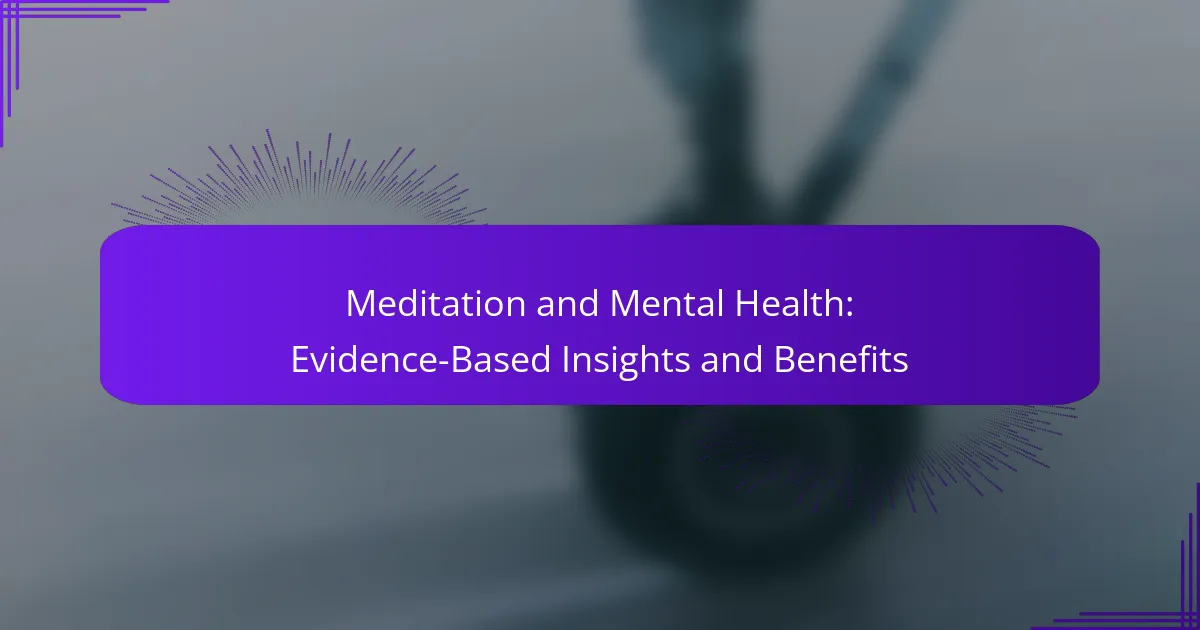Loving-Kindness Meditation (LKM) is a powerful practice that enhances emotional well-being and strengthens relationships by fostering love and compassion. By encouraging positive emotions and reducing negativity towards oneself and others, LKM can lead to improved mental health and deeper interpersonal connections.
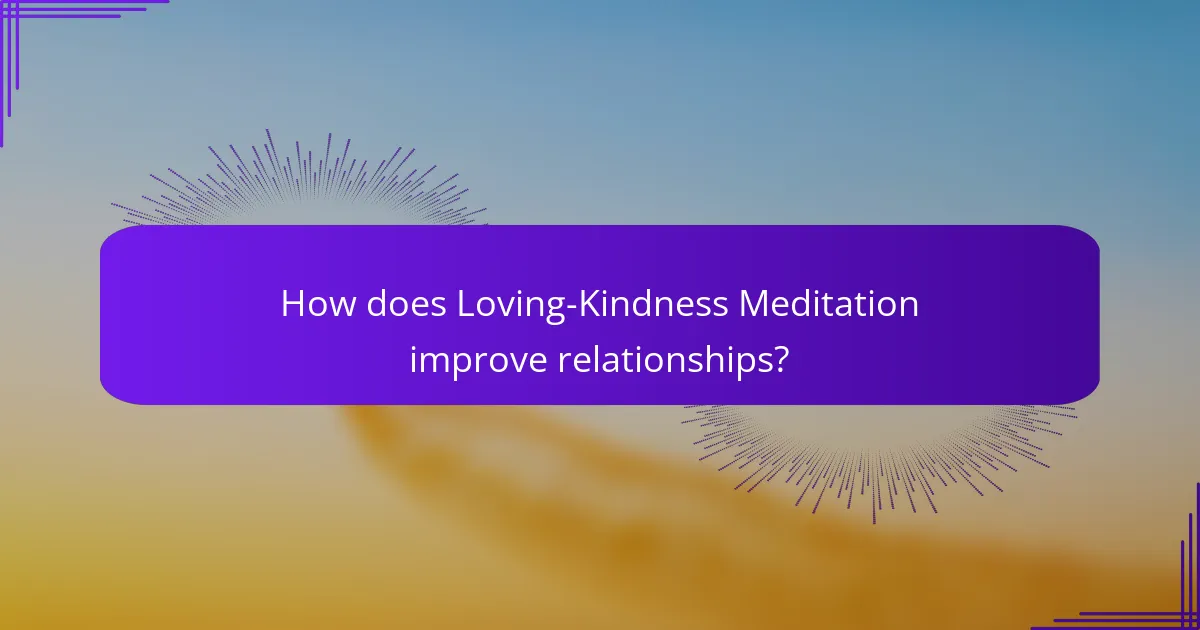
How does Loving-Kindness Meditation improve relationships?
Loving-Kindness Meditation (LKM) enhances relationships by fostering positive emotions and reducing negative feelings towards oneself and others. This practice encourages individuals to cultivate love and compassion, which can significantly improve interpersonal connections.
Enhances empathy and compassion
Loving-Kindness Meditation promotes empathy by encouraging practitioners to focus on the well-being of others. As individuals repeat phrases wishing happiness and health for themselves and others, they develop a deeper understanding of others’ feelings and experiences.
This increased empathy can lead to more compassionate responses in daily interactions. For example, when faced with a friend’s struggles, a person practicing LKM may respond with greater patience and support, strengthening their bond.
Reduces conflict and promotes understanding
Loving-Kindness Meditation helps reduce conflict by shifting focus from negative emotions to positive intentions. Practitioners learn to approach disagreements with a mindset of understanding rather than defensiveness, which can de-escalate tensions.
By fostering a sense of goodwill, LKM encourages open communication. This can lead to more constructive discussions, where both parties feel heard and valued, ultimately promoting harmony in relationships.
Strengthens emotional bonds
Regular practice of Loving-Kindness Meditation can strengthen emotional bonds by creating a shared sense of connection and support. As individuals express love and kindness towards each other, they build trust and intimacy within their relationships.
For instance, couples who engage in LKM together may find that their emotional connection deepens, leading to a more resilient partnership. This shared practice can serve as a foundation for navigating challenges together, reinforcing their commitment to one another.
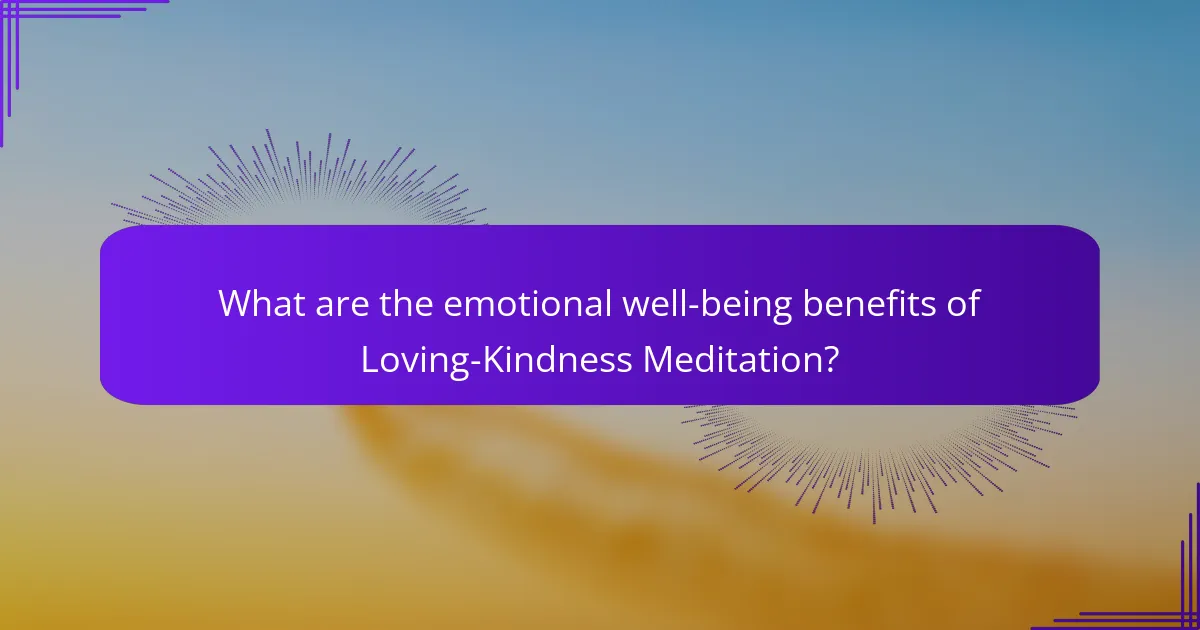
What are the emotional well-being benefits of Loving-Kindness Meditation?
Loving-Kindness Meditation (LKM) fosters emotional well-being by promoting compassion and reducing negative feelings. Practicing LKM can lead to significant improvements in mental health, enhancing relationships and overall happiness.
Reduces anxiety and depression
Loving-Kindness Meditation has been shown to effectively reduce symptoms of anxiety and depression. By focusing on generating feelings of love and kindness towards oneself and others, practitioners often experience a decrease in negative thought patterns.
Regular practice can help individuals reframe their thoughts, leading to a more positive outlook. For those struggling with anxiety, dedicating just a few minutes daily to LKM can provide noticeable relief over time.
Increases positive emotions
This meditation technique actively cultivates positive emotions such as joy, gratitude, and love. As practitioners send well-wishes to themselves and others, they often find their emotional landscape shifting towards optimism.
Studies suggest that engaging in LKM can lead to a boost in overall happiness, with many experiencing a lasting increase in positive feelings. Incorporating LKM into a daily routine can help maintain these uplifting emotions.
Improves overall life satisfaction
Loving-Kindness Meditation contributes to a greater sense of life satisfaction by enhancing emotional resilience and fostering deeper connections with others. As individuals practice kindness, they often report feeling more fulfilled in their relationships and daily interactions.
To maximize benefits, practitioners should aim for consistency, setting aside time each day for meditation. Over weeks or months, this commitment can lead to a profound shift in how one perceives their life and relationships, resulting in a more satisfying existence.
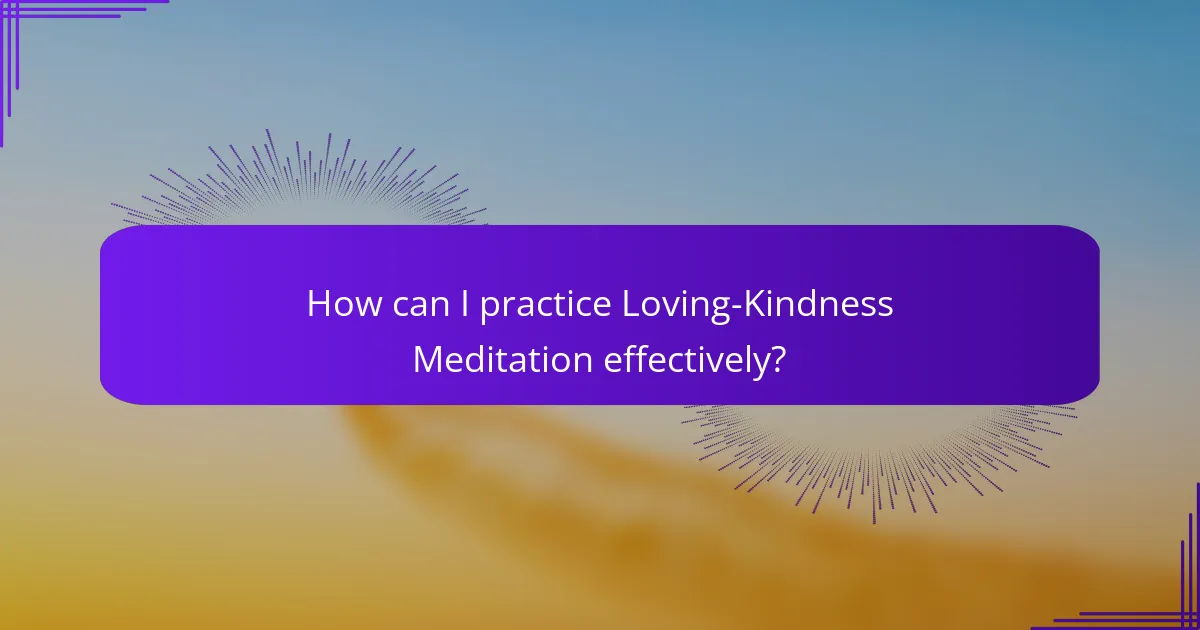
How can I practice Loving-Kindness Meditation effectively?
To practice Loving-Kindness Meditation effectively, focus on cultivating feelings of love and compassion towards yourself and others. This involves repeating specific phrases that express goodwill, while visualizing loved ones and even those with whom you have difficulties.
Step-by-step meditation guide
Begin by finding a quiet and comfortable space where you can sit or lie down without distractions. Close your eyes and take a few deep breaths to center yourself. Start by silently repeating phrases such as “May I be happy, may I be healthy, may I be safe, may I live with ease,” focusing on yourself.
Next, gradually expand your focus to include loved ones, acquaintances, and eventually those you may have conflicts with. As you repeat the phrases for each person, visualize them experiencing the feelings you wish for them. This helps deepen your emotional connection and compassion.
Recommended duration and frequency
For beginners, aim for 10 to 15 minutes per session, ideally practicing several times a week. As you become more comfortable, you can extend your sessions to 20 or 30 minutes. Consistency is key, so try to incorporate Loving-Kindness Meditation into your daily routine, perhaps in the morning or before bedtime.
Even short sessions of 5 to 10 minutes can be beneficial if done regularly. You may find it helpful to set reminders or schedule specific times in your calendar to ensure you maintain this practice.
Common challenges and solutions
One common challenge is difficulty in feeling genuine compassion, especially towards oneself. If this arises, start by focusing on someone you love deeply, allowing those feelings to gradually extend to yourself. It may take time, so be patient with your emotions.
Another issue is a wandering mind. If you find your thoughts drifting, gently bring your focus back to the phrases and the person you are visualizing. Using a guided meditation app can also help keep you on track and provide structure to your practice.
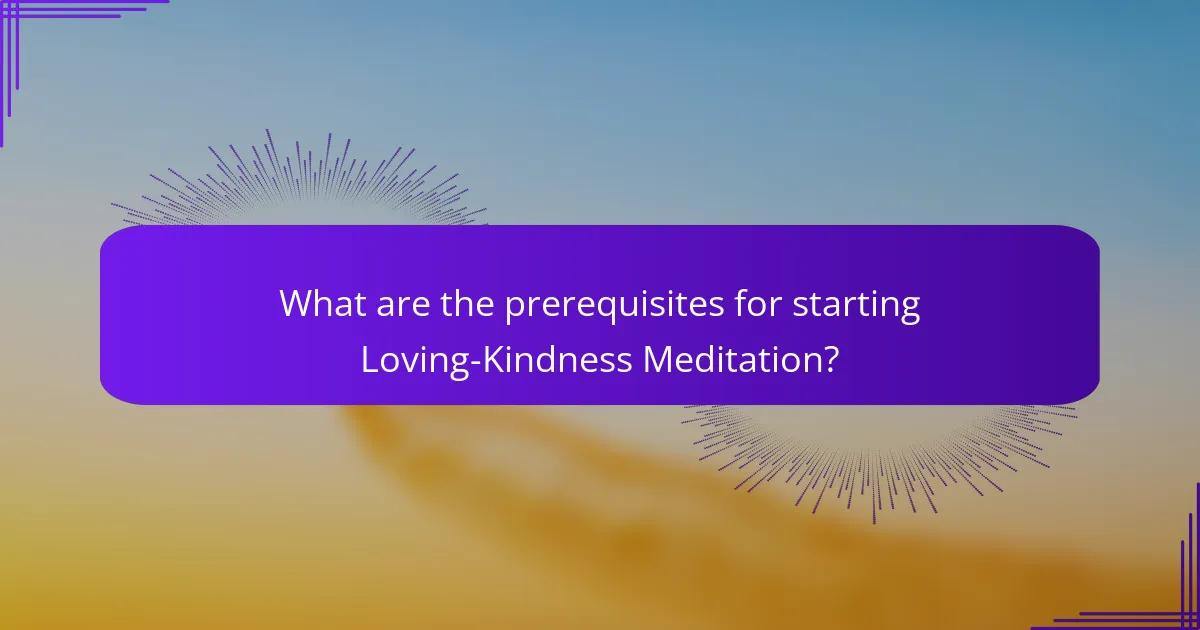
What are the prerequisites for starting Loving-Kindness Meditation?
To begin Loving-Kindness Meditation, you need an open mind and a willingness to cultivate compassion for yourself and others. Familiarity with basic meditation techniques can be helpful but is not strictly necessary.
Mindfulness basics
Mindfulness is the foundation of Loving-Kindness Meditation. It involves being present and fully engaged in the moment without judgment. Practicing mindfulness helps you become aware of your thoughts and feelings, which is essential for fostering compassion.
Start by dedicating a few minutes each day to mindfulness exercises, such as focusing on your breath or observing your surroundings. This practice enhances your ability to connect with the emotions you wish to cultivate during Loving-Kindness Meditation.
Creating a conducive environment
Establishing a suitable environment is crucial for effective meditation. Choose a quiet space free from distractions, where you feel comfortable and safe. This could be a corner of your home or a serene outdoor setting.
Consider using soft lighting, comfortable seating, and calming scents like lavender or sandalwood to enhance your experience. Setting aside a specific time each day for your practice can also help reinforce the habit and signal to your mind that it’s time to meditate.
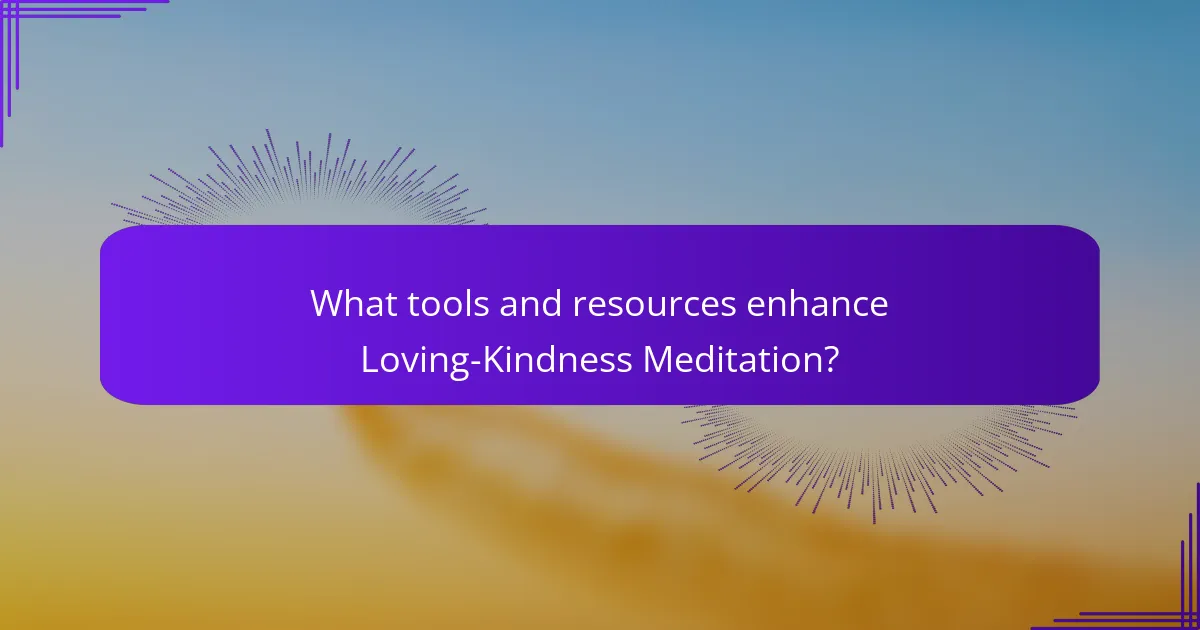
What tools and resources enhance Loving-Kindness Meditation?
Several tools and resources can significantly enhance your Loving-Kindness Meditation practice. These include mobile apps, books, and guided sessions that provide structure and support for cultivating compassion and emotional well-being.
Apps like Headspace and Calm
Apps such as Headspace and Calm offer guided Loving-Kindness Meditation sessions that can help users develop a consistent practice. These platforms typically feature a variety of meditations tailored to different needs, such as stress relief, relationship enhancement, and emotional resilience.
Both apps provide user-friendly interfaces and customizable features, allowing you to select session lengths that fit your schedule, ranging from just a few minutes to longer sessions. Consider trying the free trials to see which app resonates with you before committing to a subscription.
Books on Loving-Kindness Meditation
There are numerous books available that delve into the principles and practices of Loving-Kindness Meditation. Titles like “The Miracle of Loving-Kindness” by Thich Nhat Hanh and “Lovingkindness: The Revolutionary Art of Happiness” by Sharon Salzberg offer insights and practical exercises to deepen your understanding and practice.
When selecting a book, look for those that include guided meditations or exercises to follow along. Many readers find that having a physical book enhances their learning experience and provides a valuable reference for their meditation journey.
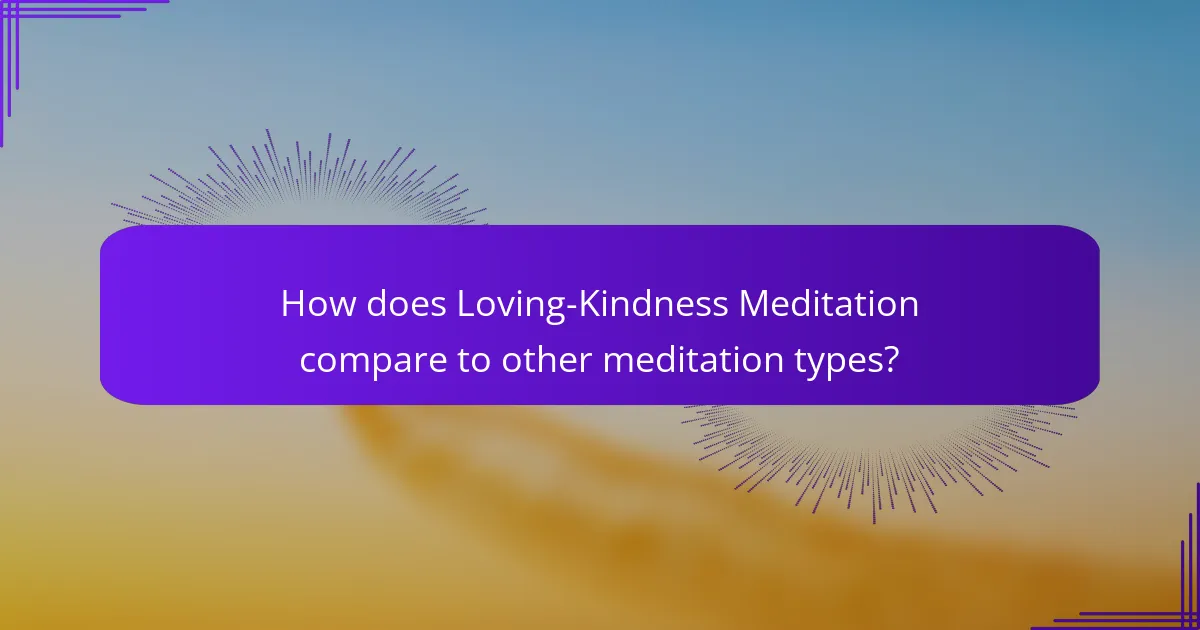
How does Loving-Kindness Meditation compare to other meditation types?
Loving-Kindness Meditation (LKM) differs from other meditation types by focusing on cultivating feelings of love and compassion towards oneself and others. While many meditation practices emphasize mindfulness or concentration, LKM specifically aims to enhance emotional well-being and interpersonal relationships through positive affirmations and intentions.
Differences from mindfulness meditation
Mindfulness meditation centers on being present and aware of thoughts and feelings without judgment. In contrast, Loving-Kindness Meditation actively encourages the generation of positive emotions, such as love and compassion, towards oneself and others. This fundamental difference shapes the overall experience and outcomes of each practice.
While mindfulness meditation often involves observing the mind’s activity, LKM requires participants to repeat phrases that express goodwill, such as “May I be happy” or “May you be safe.” This practice can lead to increased feelings of connection and empathy, which may not be as pronounced in traditional mindfulness approaches.
For those seeking to improve their emotional health and relationships, incorporating LKM alongside mindfulness meditation can be beneficial. Practitioners might alternate between the two, dedicating specific sessions to each type to harness the unique advantages they offer.
